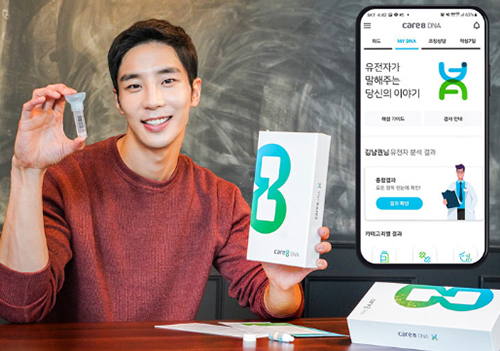As consumer demand increases for medical laboratory testing services that bypass the supervision of primary care doctors, clinical laboratories may be affected
Direct-to-consumer (DTC) genetic testing organizations and telecommunications companies in South Korea are collaborating to help consumers stay informed of their health status by sending lab test results directly to their mobile devices without requiring physician involvement. What can labs in the West learn from these developments?
One such example involves in vitro diagnostics (IVD) developer NGeneBio, which according to the company’s website, came about “as a joint venture between cancer diagnostics developer Gencurix and Korea Telecom (KT).” NGeneBio develops in vitro diagnostics, companion diagnostics (CDx), and bioinformatics software with cutting-edge technologies, including next-generation sequencing (NGS), the website states.
Founded in 2015, NGeneBio provides smartphone-based healthcare services for individuals who solicit genetic testing. Through the partnership, KT plans to combine its knowledge of artificial intelligence (AI) and cloud computing with NGeneBio’s genetic decoding expertise to “provide services such as tailored health management (diet and exercise therapy) services, and storage and management of personal genome analysis information.”
No Doctors Involved?
Outside of genealogy, the general intent of DTC genetic testing is to equip consumers with certain genetic data that may help them manage their healthcare without requiring visits to their healthcare provider. The healthcare information provided through the NGeneBio venture will include data delivered directly to customers’ smartphones on the status of their:
- skin,
- hair,
- nutrition, and
- muscular strength.
According to an article in Korean business news publication Pulse, “Genetic test services in Korea are restricted to some 70 categories, such as the analysis of the risk of hair loss, high blood pressure, and obesity.”
Last September, Pulse reported, Korean mobile carrier SK Telecom Co. announced a similar partnership with Macrogen Inc. to introduce a mobile app-based DNA testing service called “Care8 DNA.” To utilize this service, consumers order a DNA test kit, take a saliva sample via mouth swab, and then send the kit to a clinical laboratory for analysis. Users typically receive their test results on the Care8 DNA app (available from both Google Play and Apple’s App Store) within a few weeks.
The service costs ₩8,250 South Korean won ($7.36 US) per month. A one-year subscription to the service costs ₩99,000 won or $88.36 US. The Care8 DNA app features 29 testing services, including:
- skin aging,
- possibility of hair loss,
- resistance to nicotine,
- the body’s recovery speed after exercise,
- and more.
Along with those results, consumers can receive personalized health coaching guidance from professionals like nutritionists and exercise physiologists to improve their overall wellbeing, Pulse noted.

In February 2019, Macrogen became the first company in South Korea to take advantage of the government’s relaxed regulations on DTC genetic testing, Korea Biomedical Review reported. In addition to the basic services offered through the Care8 DNA app, Macrogen’s DTC tests also can cover 13 diseases, including:
- Type-2 diabetes,
- Liver cancer,
- Colorectal cancer,
- Prostate cancer,
- Lung cancer,
- Stomach cancer,
- Hypertension,
- Osteoarthritis,
- Coronary artery disease,
- Stroke,
- Atrial fibrillation,
- Parkinson’s disease, and
- Macular degeneration.
Other Korean Genetic Testing Companies Adding DTC Services
“Industry officials think DTC genetic tests should include testing for diseases,” an industry official told Korea Biomedical Review in April. “There will be more companies who make these attempts.”
One Korean genetics testing company that started its own DTC genetic testing service in 2020 is Theragen Bio. Korea Biomedical Review reported that Theragen had procured permits to test for all 70 traits allowed under DTC genetic testing per the Korea Disease Control and Prevention Agency.
Theragen’s GeneStyle DTC services website states that the testing includes:
- Body mass index (BMI)
- Triglyceride concentration
- Cholesterol
- Blood glucose control
- Blood pressure control
- Caffeine metabolism
- Skin aging
- Pigmentation
- Hair loss
- Hair thickness
- Metabolism of vitamin C
“A DTC genetic test is a contactless healthcare service suitable for the COVID-19 era. The expansion of detailed test items allows users to comprehensively check nutrients, obesity, skin, hair, eating habits, and exercise characteristics at one time,” an official at Theragen Bio told Korea Biomedical Review. “We expect that our service will attract more attention from consumers.”
What Can Be Learned?
Countries in Asia—particularly South Korea, Japan, and Taiwan—are among the fastest adopters of new technology in the world. Thus, it can be instructive to see how their consumers use healthcare differently than in the West, and how those users embrace new technologies to help them manage their health.
It is not certain how all this will impact clinical laboratories and genetic doctors in the western nations. Direct-to-consumer genetic testing has had its ups and downs, as Dark Daily reported in multiple e-briefings.
Nevertheless, these developments are worth watching. Worldwide consumer demand for genetic home testing, price transparency, and easy access to test results on mobile devices is increasing rapidly.
—JP Schlingman
Related Information:
Genetic Testing Providers Join up with Telcos to Allow Health Status Quo in Hands
KT, NGeneBio Sign Deal for Genetic Data-based Digital Health Care Service
SK Telecom Introduces Mobile App-Based DNA Test Service, Care8 DNA
Genomics Firms Aim to Widen Direct-to-Consumer Genetic Testing
Consumer Reports Identifies ‘Potential Pitfalls’ of Direct-to-Consumer Genetic Tests




